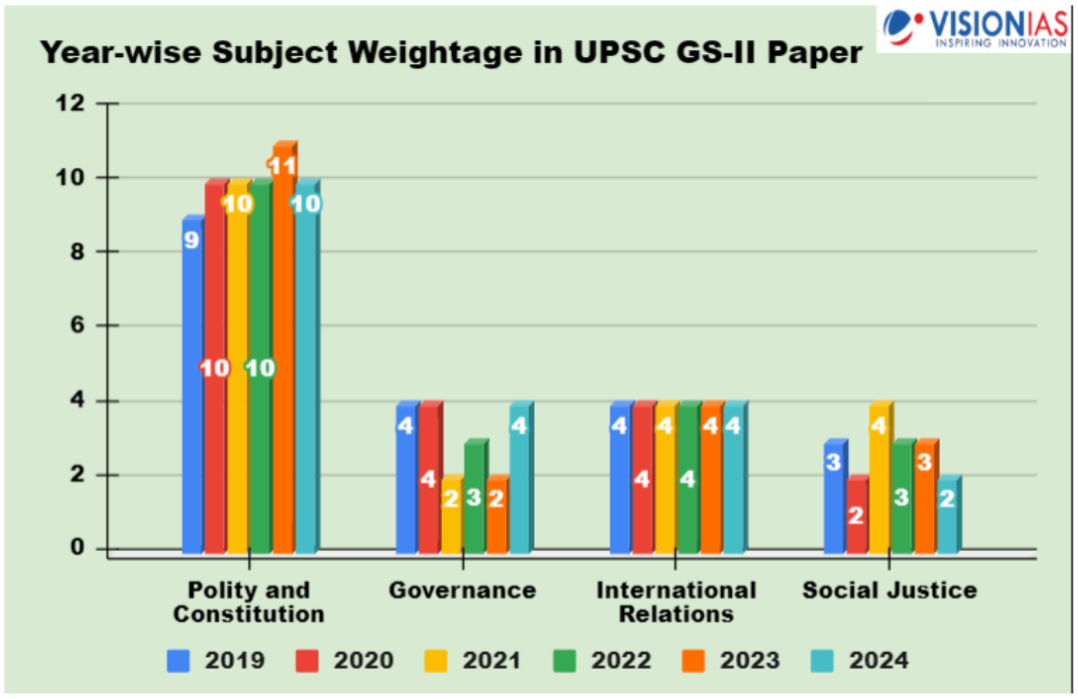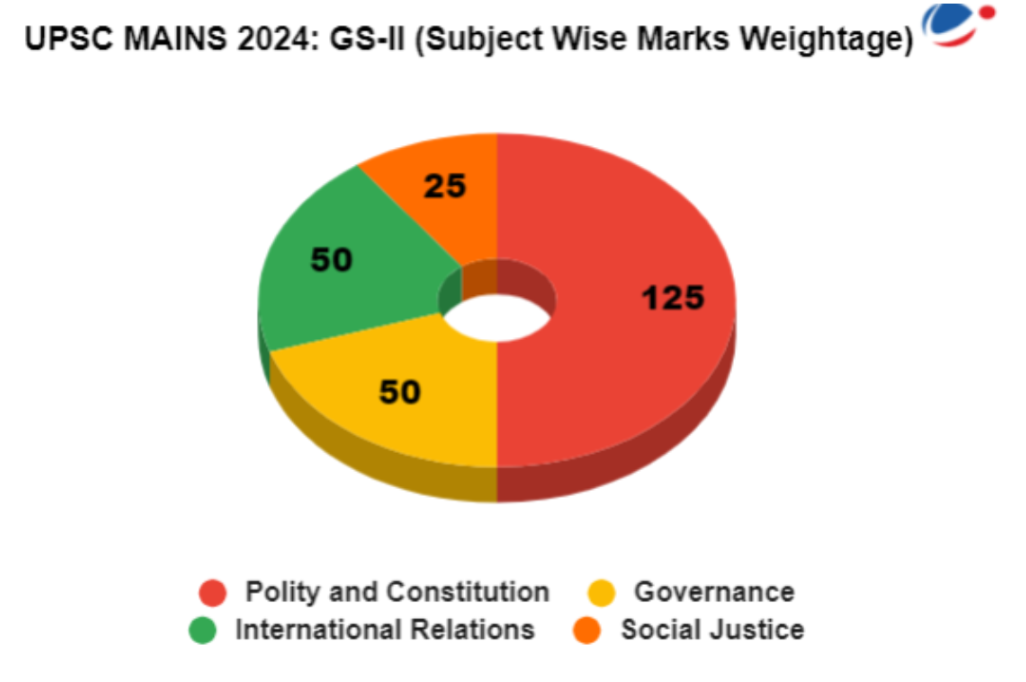General Studies Paper 2 of the UPSC Civil Services Mains Examination is a key determinant of a candidate’s overall rank. It evaluates a candidate's deep understanding of the Indian polity, governance frameworks, social justice initiatives, and international relations.
As a critical component of the civil services examination, GS2 challenges candidates to demonstrate a deep understanding of both the structural foundations and the current dynamics of Indian governance and societal issues.

Trend Analysis of UPSC Mains 2024 GS2
UPSC Mains 2024 GS Paper II was characterized by a strategic mix of questions that spanned conventional topics and novel areas reflecting recent developments. A total of 20 questions were asked to assess candidates’ abilities to integrate theoretical knowledge with practical applications. The difficulty level varied from moderate to difficult, aimed at assessing both foundational knowledge and the ability to apply this under exam conditions.
The paper explored interdisciplinary questions merging governance, politics, and law to show policy implications and encourage broad analysis, such as linking the Doctrine of Democratic Governance with Polity and Ethics. Recurring themes like electoral reforms, judiciary functions, and governance accountability emphasized enduring relevance, with a focus on past decade topics like "one nation, one election" and the role of the Comptroller and Auditor General (CAG).
Increasingly, current affairs were integrated, emphasizing ties to broader themes in Polity, Governance, and International Relations, highlighting the need for candidates to stay updated on recent events impacting governance practices.
Subject-Wise Analysis of GS2 Paper
The UPSC Mains syllabus of GS Paper II broadly categorizes its questions into four key areas: Polity & Constitution; Governance; International Relations, and Social Justice.

Polity & Constitution
The Polity & Constitution section of the UPSC Mains 2024 GS Paper-II intricately wove together static principles with contemporary issues. This section is crucial as it consistently accounts for a significant portion of marks, consisting of around 10 questions, demanding a robust understanding of constitutional doctrines amplified by recent political and legal developments.
Key Trends
- Electoral Reforms: Repeated emphasis on electoral reforms, especially the discussion surrounding "one nation, one election," highlighted the ongoing debate on improving electoral efficiency and reducing the expenditure associated with staggered elections.
- Parliamentary Accountability: Questions examining the Parliament’s role in ensuring executive accountability underscored a critical examination of democratic processes. This reflects a continued inquiry into the balance of power and the functional efficacy of India's legislative framework as seen in the 2021 and 2019 papers.
- Right to Privacy and Judicial Interpretations: The increasing relevance of privacy in the digital age, highlighted by the Kerala High Court’s January 2024 decision on DNA testing, prompted candidates to evaluate constitutional rights in light of contemporary challenges.
- Federal Structure: The enduring theme of federalism was underscored by recent debates and judicial clarifications, pushing candidates to link these discussions with broader governance issues outlined in both the static and current sections of the syllabus.
Governance
This section covers issues related to government policies and interventions, the role of various stakeholders in development, transparency, accountability, and the role of civil services in a democracy. It consistently contributes 40-50 marks (around 4 questions) and addresses governance reforms, public service delivery, and e-governance mechanisms.
Key Trends
- Digital Governance and Accountability: The role of digital platforms in enhancing governance transparency and accountability was explored, aligning with the ongoing digital India initiatives. This reflects a growing focus on how e-governance can transform public service delivery, an evolution of the theme seen in the previous year UPSC Mains exam (2018, 2020).
- Role of Civil Services in a Democracy: The 2024 question on the Doctrine of Democratic Governance highlights the importance of public perception regarding the integrity and commitment of civil servants, emphasizing their role in ensuring democratic accountability.
- Development Processes and Stakeholders: The 2024 question on public charitable trusts underscores their role in making development more inclusive, reflecting how non-governmental actors contribute to addressing public issues. This complements earlier questions on the role of NGOs and SHGs in fostering inclusive growth.
- Citizens' Charter and Accountability: The 2024 question on the Citizens' Charter addresses its role in promoting citizen-centric administration while identifying barriers to its success. Previous years questions have similarly focused on improving public service delivery through reforms like the Right to Services Act and accountability frameworks.
Social Justice
This section addresses issues like health, education, and human resource development, focusing on equitable access to services for marginalized communities. It highlights governance's role in ensuring socio-economic justice. Consistently accounting for around 25 marks, it remains a critical area for evaluating policies that aim to bridge gaps in public services and foster inclusive development.
Key Trends
- Poverty and Malnutrition: The link between poverty, malnutrition, and human capital formation has been a recurrent theme. The 2024 question focuses on breaking this cycle with concrete steps. Previous questions explored poverty alleviation programs and multidimensional poverty, but the 2024 question is more solution-oriented, emphasizing direct interventions.
- Public Healthcare: The 2024 question on marketization’s adverse impact on healthcare adds a new dimension to the theme of health reform. Past questions on universal healthcare and Ayushman Bharat focused on policy evaluation, whereas the 2024 question delves deeper into privatization and grassroots healthcare access.
- Human Resource Development: Public health and education continue to be key areas in the development of human capital. In previous years, questions addressed the broader implications of health and education on social justice, focusing on capacity-building, skill development, and inclusive growth.
International Relations (IR)
International Relations (IR) consistently accounts for around 50 marks in GS Paper II, making it a crucial section for aspirants. The questions are dynamic, integrating contemporary global events with core IR concepts. Recurring themes such as India’s neighbourhood policy, global institutions, and the U.S.-China rivalry is frequently explored.
Key Trends
- Neighbourhood Diplomacy: India’s relations with its neighbors have been a recurring theme, particularly in managing China's growing influence through initiatives like the Belt and Road Initiative (BRI) and the "String of Pearls". This year focus on India's strategic positioning in the Maldives and its role in regional stability highlights this trend.
- Global Groupings: India's engagement with organizations like QUAD, SCO, and BIMSTEC, reflecting their geopolitical and economic significance, has been frequently examined. India’s growing strategic importance with Central Asian Republics (CARS) was a key focus in 2024, emphasizing their geopolitical relevance.
- Geopolitical Challenges: A consistent theme includes India’s balancing act between the U.S.-China rivalry, with efforts to counterbalance China's rise through strategic partnerships like AUKUS and Indo-Pacific strategies. In 2024, this continues with questions on the West viewing India as a key strategic alternative to China.
- Global Security and International Institutions: International institutions have been a focus, with questions on the IMO, WHO, and UNESCO exploring their roles in global governance. In 2024, for the first time, the spotlight shifted to security with a question on the UN Security Council’s Counter-Terrorism Committee (CTC), reflecting the increasing importance of global governance in addressing modern security threats like terrorism.
GS-2 Mains 2025 Insights : Difficulty level, Weightage, Trend analysis
To be updated soon
UPSC MAINS GS-2 STRATEGY:
Candidates should note the following points while preparing a strategy for GS-2:
- Go through the syllabus thoroughly. UPSC provides only two reference materials to candidates i.e. the syllabus and past year questions.
- Once the candidates are familiar with the syllabus, they should check the past year question papers in order to understand the type of questions that are asked, trends, topics that are repeated, etc.
- The initial focus should be on understanding the fundamental concepts of polity, such as separation of powers, basic structure doctrine, transparency and accountability in governance, foreign policy of India, India’s relations with its neighbours, welfare schemes, etc. Reading and understanding the Constitution is pertinent for GS-2 paper (especially the topics that are repeatedly asked and those that are covered by the news). Students should also know about relevant Committee Reports, Commissions, etc. (for example, 2nd ARC Report, Sarkaria Commission, etc.)
- While preparing on various topics, candidates should prepare notes that are concise and easy to revise. Similarly, candidates should go through current affairs material and prepare notes that are relevant for the exam. Important schemes/relevant examples should be noted down in order to use them in the answers.
- Simply studying and preparing notes is not enough for UPSC preparation. Candidates need to practice answer writing in order to familiarize themselves with UPSC’s pattern.
- After practicing writing answers, candidates should attempt mock papers. This will help candidates write answers within a specific time frame. Time management is a skill that the candidates need to master while preparing for mains.
- Candidates should then focus on revision. They should go through their notes as well as model answers of mock tests.